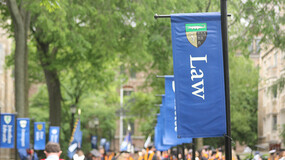
Professor Monica Bell Named Radcliffe Fellow
Professor of Law Monica C. Bell ’09 has been named a 2025–26 Harvard Radcliffe Institute fellow, the Institute announced on May 15.

The Budget Lab at Yale Celebrates One Year of Innovative Policy Analysis
In its first year, The Budget Lab at Yale has evolved into a leading national voice in policy analysis, tackling some of the most complex and pressing economic issues facing the country today.

Yale Law School Commencement to be Held May 19
Yale Law School will honor members of the Class of 2025 with its Commencement celebration on May 19 in New Haven.

A Passion for Policy and Putting in the Work: Ludwig Fellows Visit Washington, D.C.
For the second year in a row, students in the Ludwig Program, part of The Tsai Leadership Program at Yale Law School, visited Washington, D.C., to meet with leaders from across the spectrum of public service.

Stephanie Safdi ’13 to Join Law School Faculty
Dean Heather K. Gerken has announced that Stephanie Safdi ’13 will join the Yale Law School faculty as a Clinical Associate Professor of Law on July 1, 2025.

Students Urged to Think Like Policymakers to Address Homelessness and Housing
At a time when the United States is experiencing a nationwide housing crisis, a course at Yale Law School is pushing students to formulate real-world solutions to one of today’s most complex and pressing issues.

Professor Oona Hathaway Named President-Elect of the American Society of International Law
Professor Oona Hathaway ’97 will lead the premier international law organization in the United States with 4,000 members.

Becca M. Heller ’10 Honored with Changemaker Award for Work with IRAP
Becca M. Heller ’10 was presented with the inaugural Changemaker Award during a regional Making History alumni event that took place on April 1 in New York City.




